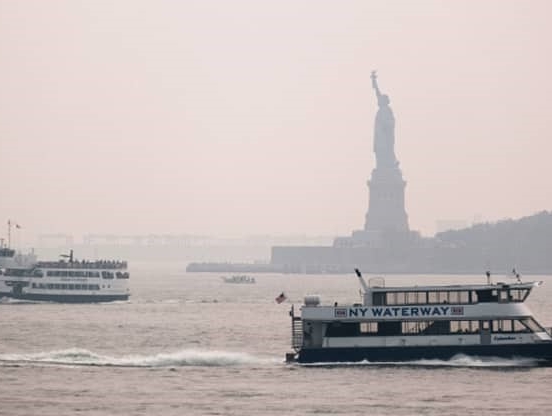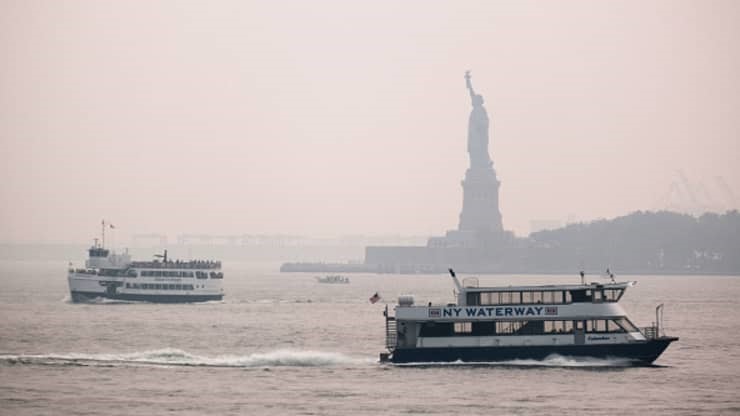Climate, Health and Equity Brief
Fire, smoke and all eyes on Washington, D.C.
July 26, 2021

The Climate, Health & Equity Brief is GMMB’s take on the week’s news on the current impacts of climate change. If you haven’t subscribed yet, you can do so by clicking here.
Hot Topic: As the world burns. After over a month of negotiations, the Senate is expected to vote on its bipartisan infrastructure package on Monday. At the same time, Democrats are on a tight timeline to develop the framework for a budget resolution that will provide $3.5 trillion for the climate provisions and other social services that Republicans slashed from President Biden’s original proposal. But as political roadblocks continue to hinder the future of both pieces of legislation, members of Congress need only step outside and breathe Washington, D.C.’s uncharacteristically smoky air for a reminder of what’s at stake.
This week, smoke from more than 100 fires in the U.S. West Coast and Canada reached East Coast cities including Washington, New York and Philadelphia with their noxious fumes and harmful particulates, emphasizing the increasingly far-reaching impacts of wildfire season. Oregon’s Bootleg fire, sparked on July 6 and already the largest U.S. wildfire this year, has scorched more than 400,000 acres of forest and grasslands so far—an area almost ten times the size of Washington, D.C. The flames have become so massive and hot that the fire is changing the weather in the region, generating fire tornadoes that propel embers, spark more flames, increase fire danger and create erratic conditions that hinder efforts to control the burn.
And as fire season picks up, agricultural producers from California to Canada are facing even more devastation. Many Napa vineyards are now struggling to find insurers willing to provide coverage for fires. Even for wineries whose grapes remain untouched by flames, smoke and particulates from nearby wildfires are tainting entire vintages, threatening livelihoods and the dealing a setback to the region’s wine output.
And fires aren’t the only threat to the grapes. Record-breaking heatwaves have prompted vintners to protect their fruit with tactics ranging from shade cloth to sunscreen. In Canada, temperatures topping 110°F have ruined up to 50 percent of many crop yields; June’s heat wave alone led to cherries roasting on trees, wheat drying up in fields and livestock facing feed and water shortages.
Despite the fact that the U.S. has already had four heat waves this year, meteorologists are predicting another week of sweltering temperatures across the lower 48 next week. Climate change is no longer a far-away threat to our lives and economies, so our national priorities and policies must reflect the urgency of this crisis. A recent report from the Rocky Mountain Institute emphasized “the most important year to reduce carbon pollution is this year,” underscoring how each passing day of gridlock on the Hill delays urgent climate action. It’s time to wake up and smell the smoke—and then pass the legislation we need for a cleaner, healthier future.
— Matt & Traci, GMMB
Human Health
Smoke from more than 100 fires burning across Canada and the U.S. West drifted as far east as New York City this week, smothering the region in haze and triggering air quality advisories in multiple cities. (San Francisco Chronicle)
New research revealed that wildfire smoke exposure is associated with several elevated health risks, including lead poisoning and increased susceptibility to respiratory illnesses such as asthma and COVID-19. (San Francisco Chronicle)
China’s Henan province endured almost a year’s worth of rain in a single day, inundating major underground subway tunnels and setting off floods that have killed at least 33 people and displaced more than 1.2 million more thus far. (The Washington Post)
Thousands of people demanding water relief from local officials were met with gunshots, tear gas and other forms of police violence this week as severe drought conditions fueled by rising planetary temperatures worsen historic water mismanagement in Iran. (The New York Times)
Planetary Health
The Bootleg Fire in Oregon—the largest of the year so far having burned more than 400,000 acres—is so powerful that it has begun altering the weather and atmosphere, spawning a fire tornado, lightning and powerful winds that have propelled the blazes well past firebreak lines. (The New York Times)
As a new International Energy Association report warns that global carbon dioxide emissions are set to reach record high levels in 2023, another report found that the U.S. is on track to reduce emissions by just 26 percent by 2030—far below its 50 percent reduction target. (Truthout and Axios)
As heat waves sweep across British Columbia, farmers in Canada are facing devastating consequences, including roasted cherries and withered grains as well as a dwindling supply of feed and safe water for their livestock. (The Washington Post)
Poison ivy is getting stronger and itchier thanks to climate change, thriving off of the increased levels of carbon dioxide in the air and warmer soil temperatures which enable it to grow faster. (Grist)
How is there laughter, how is there joy, as this world is always burning?”
-Jack Kerouac
Equity
A recent analysis of extreme heat impacts in Oregon’s Multnomah County found that 61 percent of deaths resulting from recent heat waves occurred in zip codes with a higher poverty rate than the county average, underscoring the disproportionate effects of extreme heat on low-income communities. (The Washington Post)
An increasing number of immigrants from agrarian areas across Latin America are making the dangerous trek to the U.S. border as natural disasters and the changing climate decimate their crops and worsen food insecurity, malnutrition and poverty. (Politico)
Despite being disproportionately vulnerable to climate extremes, more than 500 low-income communities and communities of color in the U.S. have been left without any funding from FEMA resiliency grants due to a lack of state and local requisite matching funds. (NBC News)
Politics & Economy
After the bipartisan infrastructure plan failed a test vote in the Senate, Democrats are considering whether to pair physical infrastructure plans with a separate plan to address climate change, child care and health care. (CNBC)
Environmental and voting rights advocates are worried that proposed voting restrictions across the U.S. could reduce voting turnout among communities of color, who are more likely to support progressive energy and climate policies than white voters. (Politico)
New research estimates that 40 percent of all food produced goes uneaten and that food waste accounts for ten percent of all greenhouse gas emissions. (CNN)
In the face of severe drought, oppressive heat and raging wildfires, Napa Valley winemakers are taking extreme steps to prevent over $400 million in losses and protect their grapes, including covering them in sunscreen and using treated wastewater for irrigation. (The New York Times)
A Northern California hydroelectric power plant is likely to shut down for the first time since 1967 due to the historic drought after lowest rainfall rates in 126 years, removing a megawatt of clean power from the grid. (Our Daily Planet)
Action
The White House has developed the Justice40 initiative, a plan to ensure at least 40 percent of benefits from federal energy and environmental spending reach disadvantaged communities, including flood mitigation, lead removal and rural energy grants. (E&E News)
Greenland is suspending all oil exploration, sacrificing an estimated 17.5 billion barrels of oil and 148 trillion cubic feet of natural gas along their coast in order to combat climate change. (Our Daily Planet)
The city of Madrid is planting an urban forest with nearly half a million new trees to improve air quality, fight the heat island effect in the city and absorb 175,000 tons of carbon dioxide per year. (Euronews)
Kicker
Check out these new satellite images that show how wildfire smoke from the West is traveling to the East Coast.
The GMMB Climate, Health & Equity Brief would not be possible without the contributions of the larger GMMB California team—Aaron Benavides, Elke Cortes, Stefana Simonetto and Sydney Lykins. Feedback on the Brief is welcome and encouraged and should be sent to CHandEBrief@gmmb.com.






